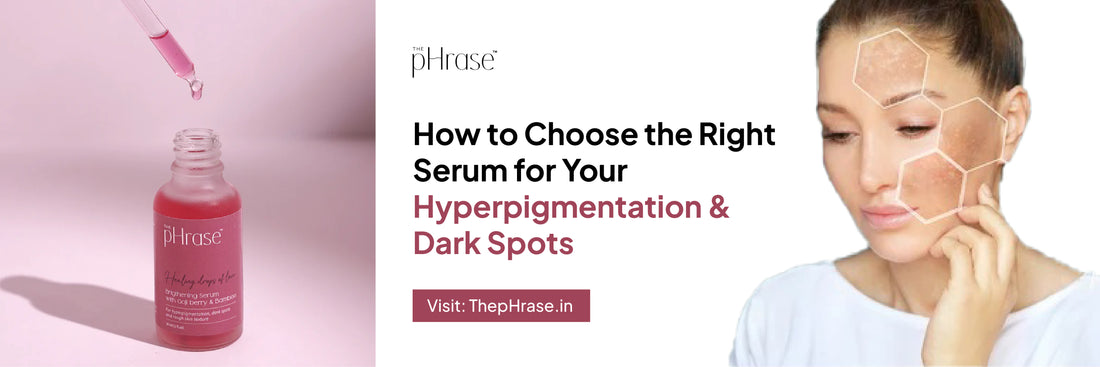
How to Choose the Right Serum for Your Hyperpigmentation & Dark Spots
Share
Hyperpigmentation and dark spots are common skin issues, especially in India where sun exposure and pollution can exacerbate these conditions. Hyperpigmentation is characterized by patches of skin that become darker than the surrounding skin due to excess melanin production. This can be triggered by various factors such as sun exposure, hormonal changes, and skin injuries. While not harmful, hyperpigmentation can affect one's confidence and overall skin health. Choosing the right serum can be a game-changer in managing and reducing these dark spots. This article will guide you on how to select the best serum for your hyperpigmentation and dark spots.
Understanding Hyperpigmentation
Hyperpigmentation occurs when there is an overproduction of melanin, the pigment that gives skin its color. Factors that can trigger this include:
- Sun Exposure: UV rays stimulate melanin production, leading to sunspots and melasma.
- Hormonal Changes: Conditions like pregnancy or hormonal imbalances can trigger melasma.
- Inflammation: Skin injuries or acne can lead to post-inflammatory hyperpigmentation.
- Genetics: Heredity can also play a role in hyperpigmentation.
Key Ingredients to Look for in Serums
When choosing a serum for hyperpigmentation and dark spots, it’s essential to look for specific ingredients that are known to be effective in treating these issues. Here are some key ingredients:
1. Vitamin C
Benefits: Vitamin C is a powerful antioxidant that helps to brighten the skin, reduce dark spots, and protect against UV damage. It inhibits the enzyme tyrosinase, which is involved in melanin production.
2. Niacinamide
Benefits: Also known as Vitamin B3, niacinamide helps to reduce inflammation, lighten dark spots, and improve the skin’s barrier function. It is suitable for all skin types and helps in reducing post-inflammatory hyperpigmentation.
3. Hyaluronic Acid
Benefits: While not directly targeting hyperpigmentation, hyaluronic acid helps to hydrate and plump the skin, enhancing the efficacy of other active ingredients.
4. Kojic Acid
Benefits: Derived from fungi, kojic acid is effective in lightening sunspots and hyperpigmentation. It works by inhibiting the production of melanin.
5. Retinol
Benefits: Retinol, a form of Vitamin A, accelerates cell turnover and promotes the shedding of pigmented, damaged skin cells, leading to a brighter and more even skin tone.
How to Choose the Right Serum
Choosing the right serum involves understanding your skin type, the severity of your hyperpigmentation, and the formulation of the serum. Here’s a step-by-step guide:
1. Identify Your Skin Type
- Oily Skin: Look for serums with lightweight, non-comedogenic formulations.
- Dry Skin: Choose serums with hydrating ingredients like hyaluronic acid and glycerin.
- Sensitive Skin: Opt for serums with soothing ingredients like niacinamide and avoid high concentrations of active ingredients that might cause irritation.
- Combination Skin: Balance is key; look for serums that address both oily and dry areas.
2. Check the Active Ingredients
Ensure the serum contains one or more of the key ingredients mentioned above. The concentration of these ingredients is also crucial. For instance, a serum with 10-20% Vitamin C can be effective for brightening and reducing dark spots.
3. Read Reviews and Testimonials
Look for products with positive reviews and testimonials from users with similar skin concerns. This can give you a better idea of the serum’s effectiveness.
4. Patch Test
Always perform a patch test before incorporating a new serum into your routine. Apply a small amount of the product on your inner forearm and wait for 24 hours to check for any adverse reactions.
Product Recommendation

For those struggling with hyperpigmentation and dark spots, consider trying the Brightening Serum for Hyperpigmentation and Dark Spots by The pHrase. This serum is formulated with key ingredients like goji berry and bamboo, which are known for their skin-brightening and anti-inflammatory properties.
- Goji Berry: Rich in antioxidants, goji berry helps to reduce oxidative stress and promotes a brighter complexion.
- Bamboo: Contains essential amino acids and minerals that help to soothe and hydrate the skin.
How to Incorporate the Serum into Your Routine
To get the best results from your serum, follow these steps:
- Cleanse: Start with a gentle face wash to remove dirt and impurities.
- Tone: Apply a toner to balance the skin’s pH and prepare it for better absorption of the serum.
- Apply Serum: Take a few drops of the serum and gently massage it into your face and neck, focusing on areas with dark spots.
- Moisturize: Follow up with a moisturizer to lock in the serum’s benefits.
- Sunscreen: During the day, always apply a broad-spectrum sunscreen to protect your skin from UV damage.
According to a report by Grand View Research, the global hyperpigmentation treatment market size was valued at $1.3 billion in 2023 and is expected to grow at a compound annual growth rate (CAGR) of 6.4% from 2024 to 2032. The increasing demand for skincare products that address hyperpigmentation and dark spots is driving this growth.

FAQs
- What causes hyperpigmentation? Hyperpigmentation is caused by an overproduction of melanin, which can be triggered by sun exposure, hormonal changes, skin injuries, and genetics.
- What is post-inflammatory hyperpigmentation? Post-inflammatory hyperpigmentation occurs when the skin darkens in response to an injury or inflammation, such as acne.
- How can I prevent hyperpigmentation? Use sunscreen daily, avoid picking at skin injuries, and use skincare products specifically formulated to prevent hyperpigmentation.
- How do I choose the right serum for dark spots? Look for serums with ingredients like Vitamin C, niacinamide, and kojic acid, and choose formulations that suit your skin type.
- How often should I use a serum for hyperpigmentation? Most serums can be used daily, but it’s important to follow the product instructions and start slowly if you have sensitive skin.
- Can serums really lighten dark spots? Yes, serums with the right active ingredients can help lighten dark spots over time with consistent use.
- Should I use a serum in the morning or at night? Some serums can be used both morning and night, but always use sunscreen during the day to protect your skin.
- How long does it take to see results? Results can vary, but you may start to see improvements in 4-6 weeks with regular use.
- Can I use multiple serums for hyperpigmentation? It’s best to consult with a dermatologist before layering multiple serums to avoid irritation and ensure compatibility.
Achieve a brighter, more even complexion with the right serum for your skin. Visit The pHrase today to explore our range of brightening serums formulated to combat hyperpigmentation and dark spots. Take the first step towards healthier, glowing skin now!
Choosing the right serum for hyperpigmentation and dark spots can make a significant difference in your skincare routine. By understanding your skin type and looking for the right ingredients, you can effectively reduce dark spots and achieve a more even, radiant complexion. Make sure to follow a consistent skincare routine and protect your skin from sun exposure to maintain your results.
